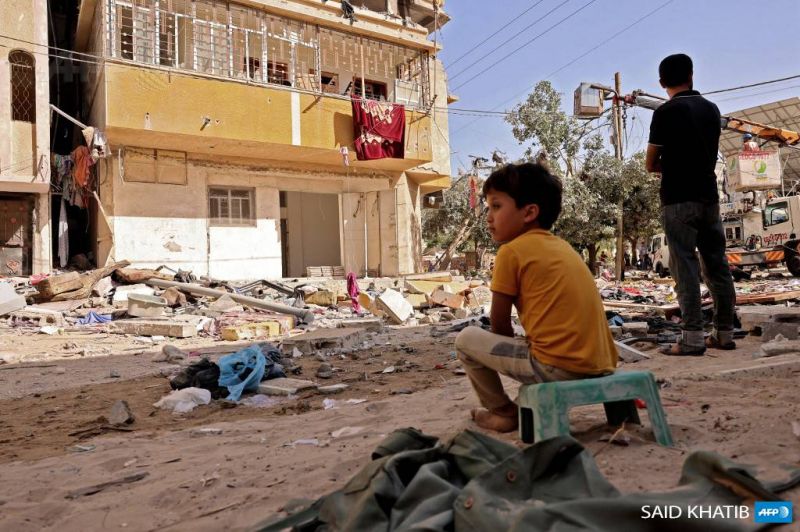
A man and a child overlook the destruction of a neighborhood in Gaza city. (Credit: Said Khatib/AFP)
BEIRUT — The Lebanese TV channel LBCI and its journalist Rawad Taha are facing controversy after publishing a video online on Thursday calling the Gaza war a battle of the "crazy and the extremists, starting with the events of Oct.7."
Hamas launched an unprecedented attack on Israel on Oct.7 via air, land, and sea, captured Israeli hostages and took them back to Gaza. The purpose, according to the Hamas document titled "Our Narrative: Operation Al-Aqsa Flood," was to negotiate an agreement with Israeli in which Hamas would exchange the hostages for as many of the thousands of Palestinians detained in Israeli prisons as possible. Israel retaliated by carpet bombing the enclave, killing over 31,500 Palestinians. The bombardments have also killed several Israeli hostages, Hamas says.
In his reel, Taha called the "crazy leaders in Gaza and the crazy right-wing leaders in Israel two sides of the same coin."
He compared Israel's far-right Finance Minister Bezalel Smotrich — who he said had "threatened to set fire to a bridge and had bought 700 L of diesel to set fire to implement this, in an attempt to pressure Israeli troops to not withdraw from Gaza in 2005" — to Mohammed Deif, the head of the Qassam Brigades, which is the armed wing of Hamas.
He accused Deif of refusing to follow a "peaceful path" after the Oslo Accords "and give up the use of arms against Israel as the Fatah Movement did."
The Oslo agreement signed in the early 1990s was meant to lead to an independent Palestinian state, but years of stalled negotiations and bloody violence have left no peaceful resolution of the ongoing conflict.
"Deif continued fighting against Israel by resorting to suicide attacks killing Israeli civilians," Taha said. He also said that Yahya Sinwar, the head of Hamas, "did not think of developing Gaza but engrossed himself in building tunnels for Hamas that cost millions of dollars and got rid of Fatah leaders by throwing them from the top of buildings."
He accused Hamas leaders of not caring that Israel would "come back and attack Gaza" after the events of Oct. 7 and of not caring how many Palestinians would lose their lives as a results.
Some in Lebanon saw Taha's reel as his right to express his opinion while others saw it as an attack on the various resistance movements by comparing them to Israel.
Independent Zgharta MP Michel Douaihay said on X that "freedoms in Lebanon, especially freedom of expression and opinion, are an integral part of the formation of Lebanon, and the law in this context guarantees the protection and support of freedom of opinion. From this standpoint, we must respect each other's opinions and listen and discuss all issues, no matter how precise or sensitive they are, without betraying or wasting people's blood."
يتعرض الإعلامي والصحافي @rawadtaha لحملة كبيرة ضده والسبب موضوع تقريره الأخير.
— Michel Douaihy ميشال دويهي (@MDOUAIHY) March 15, 2024
إن الحريات في لبنان، وخاصةً حرية التعبير والرأي ، هم جزء لا يتجزأ من تكوين لبنان، والقانون في هذا السياق يكفل حماية حرية الرأي ويدعمها.
من هذا المنطلق، يجب علينا احترام آراء بعضنا البعض والاستماع…
Journalist Dima Sadek wrote that she "personally disagrees with the way Rawad presented his argument" but noted that she is against anyone calling him a "traitor" for his opinion.
بموضوع تقرير الزميل رواد طه.
— Dima ديما صادق (@DimaSadek) March 15, 2024
التقرير المهني يناقش، بسجل الإعجاب فيه، تسجل انتقادات عليه، تُناقش تفاصيله ، ( شخصيا اختلف مع معالجة رواد ) ، لكن لا تعلق له مشانق التخوين!!!
ان اخطر ما نعاني منه في هذه المرحلة هي أصوات تخوين ديكتاتورية البروباغندا التي تحلل دمنا علنا. مين هي…
The head of news and political shows at Al Jadeed TV channel, Mariam al-Bassam, wrote on X that "LBCI summed up the suffering of the Palestinian people for 75 years, gave the resistance fighters the title of lunatics and equated them with Israeli extremists.
"If you started like this [addressing Taha] as a young journalist, what do you have in store for when you grow up?" al-Bassam said.
Lbci
— مريم البسام (@MariamAlbassam) March 14, 2024
اختصرت معاناة ٧٥ سنة للشعب الفلسطيني واعطت المقاومين لقب المجانين وساوت بينهم وبين المتطرفين الاسرائيلين،
والله ستر انو ما ميّل هالشب الهاوي على جبهة الشمال وكزدر بالجنوب كان طلع معو التباديع .
يلعن ابو الصحافة اذا صارت بتعطينا الحق ندمّر.. اصحاب الحق.
اذا مبلش هيك باول… pic.twitter.com/HwhKG60J4T
Rita El Jammal, a journalist at Al Araby TV, wrote that "the problem with Rawad Taha's report is that this complex issue can't be explained and summarized in a reel probably done on a mobile, which makes it easy to fall into the trap of the Israeli narrative when you are forced to summarize. The conflict has a deep history that we cannot summarize in two minutes and colloquial talk with expressions that are far from the professional journalistic style."
المشكلة بتقرير #رواد_طه إنو صحافة الموبايل والمحتوى السريع واللعب على الصور والتكنولوجيا اللي دارجة هالفترة بالاعلام العصري ما بتنطبق ع القضية اللي طارحها، يعني هيك موضوع عادة بينعملو وثائقي طويل عريض ع قد منو حسّاس ودقيق وفي معلومات لازم يتأكد منها ويكون في ادلة عليها وبحث…
— Rita El Jammal (@rita_jammal) March 15, 2024
After facing heavy criticism, LBCI deleted the post from X but kept it on Instagram.
On his personal Instagram account, Taha thanked those who stood by him and said that he will keep ignoring the "trolls" and that freedom of expression is "sacred" in Lebanon.